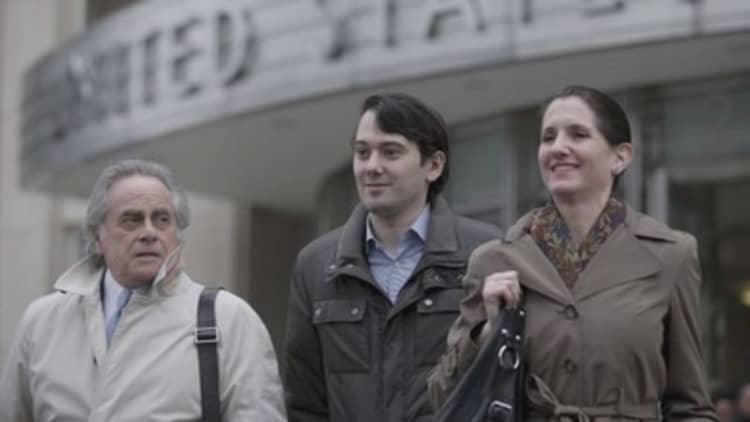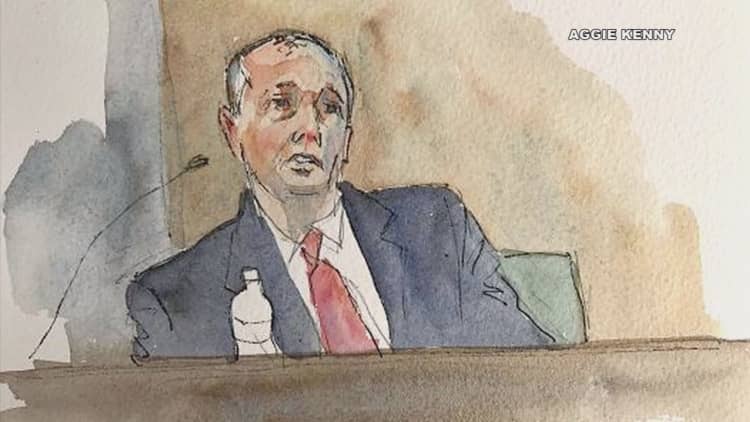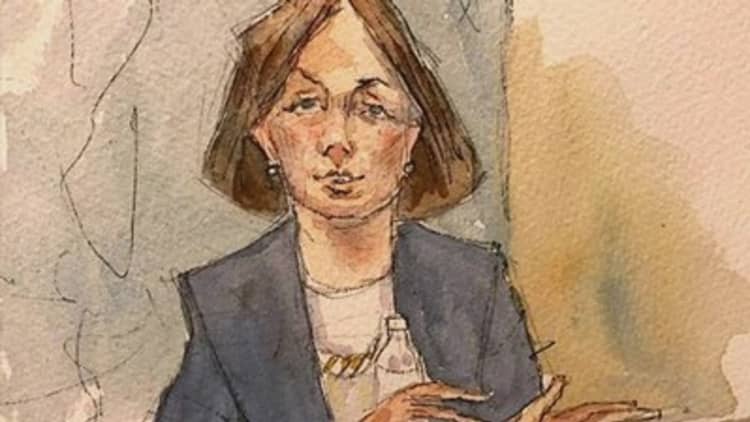The ex-chairman of Martin Shkreli's drug company testified Wednesday he "was absolutely stunned" that Shkreli "lied to my face" during a 2014 meeting, which soon afterward led to the ouster of the "Pharma bro" as CEO.
Former Retrophin Chairman Steve Richardson also testified that when he and other board members told Shkreli he needed to leave as CEO, Shkreli "said 'I'll beat you guys to build my own new company, and I'll get to a billion dollars before you can."
Richardson's testimony came at Shkreli's securities fraud trial in Brooklyn, New York, federal court.
During cross-examination by Shkreli's lawyer, an increasingly crimson-faced Richardson admitted that in a 2010 email to Shkreli he wrote, "only if I can touch your soft skin," and on another occasion encouraged him in an email to take a "bubble bath."
Richardson insisted that the comment about touching Shkreli's skin referred to the fact that Shkreli had had "a very nasty-looking rash" on his neck and ears, which he had avoided treating medically.

A prosecutor, after that cross-examination, introduced an email from Shkreli to Richardson in April 2010 that had a subject line which said, "The skin around my neck is all better."
And Richardson said the comment about the bubble bath may have been in response to a prior call with Shkreli where they discussed Shkreli not feeling well.
In testimony Tuesday, Richardson, who is gay, said he had felt uncomfortable with Shkreli in 2010 suggesting that he, Shkreli, might have sex with a worker in his office, or with a waiter.
Richardson, who at the time was investing in Shkreli's hedge fund, said he felt like Shkreli was making the comments because he believed Richardson wanted to hear such things. Richardson said he ended up telling Shkreli to stop making such comments, and that Shkreli later talked about dating women.
Shkreli's lawyer, Benjamin Brafman, previously has suggested that Shkreli was the target of negative comments by colleagues who questioned his sexuality.
Shkreli is accused of looting stock and cash from Retrophin, the company he started in 2011, to pay back investors he allegedly defrauded at two hedge funds he ran.
Shkreli, 34, has pleaded not guilty. He first gained public notoriety in 2015 for raising the price of the drug Daraprim by more than 5,000 percent while running Turing Pharmaceuticals, which he founded after being kicked out of Retrophin.
Richardson, 63, is a former top human resources executive at American Express. He had said that after meeting Shkreli at a cocktail party in 2009 at an apartment in New York City's East Village neighborhood, he ended up investing $400,000 in one of the hedge funds Shkreli ran, MSMB Capital.
That money and the investment returns Shkreli claimed it was earning, Richardson testified, were rolled over into funding the start-up of Retrophin, which he joined as an independent member of the board of directors.

Richardson testified Wednesday that he learned only in March 2014, while being questioned by the Securities and Exchange Commission, which was investigating Shkreli, that Shkreli had been sued by Merrill Lynch years before over a debt MSMB Capital incurred from trading.
When he asked Shkreli afterward why he was only just then hearing about that lawsuit, Richardson said Shkreli responded, " 'I didn't tell you the specifics because I didn't want to come across as a failure on that.' "
Shkreli added, according to Richardson, that "I covered it, and I moved on, and you saw that in your investments.' "
In fact, other witnesses have said, the loss that MSMB Capital incurred from a short sale trade of Orexigen Therapeutics effectively wiped out the hedge fund's assets, and left the fund owing Merrill Lynch $7 million or more.
If that is true, then Richardson would have had no or relatively little money left from his stake in MSMB Capital because of that failed trade.
Richardson testified that as Retrophin was growing, he sought information from Shkreli to clarify how many shares Richardson had in the company as a result of the transfer of his MSMB Capital funds and from subsequent direct investments in Retrophin.
When Shkreli, after some delay, got back to him with a number, Richardson was unhappily surprised to learn that his stake in the company might leave him with a loss compared to what he had invested in MSMB Capital. That didn't make sense, Richardson said.
He emailed Shkreli, writing, "As a founding investor, how can there not be an accurate accounting of my accumulated investments? This is a huge disappointment to me and also a lesson in letting my friendship drive blind faith."
He said Shkreli promised along with another Retrophin executive to give Richardson shares to make up the different between what Richardson had in stock, and what he believed he should have given his actual investment.
Richardson said he never got those shares.
However, Richardson also testified about Shkreli's "excellent" performance growing Retrophin, and acquiring drugs for the company's portfolio, while "working long hours."
But by June 2014, "there were two or three things" that the small board of the company was "concerned" about, Richardson said.
One was Shkreli's strained working relationship with a top Retrophin executive, Richardson said. Another was the fact that "he wasn't following through on some of his commitments" regarding stock trading with investors' cash in Retrophin being done by company employees.
Richardson said he and other members of Retrophin's board became concerned about that trading, which he described as a "hedge fund" within Retrophin. They told Shkreli to scale back such activity, Richardson said.
The other directors and Richardson also were talking about speeding up the the process of moving Shkreli out as CEO and into another role at Retropin.
"We'd been discussing it for a while," Richardson said.
"The context ... was we saw Martin was excellent at the set-up stages, but he didn't have the experience, the leadership to run" a large, complex company, as Retrophin was becoming, Richardson said.
In September 2014, Richardson said, he arranged to having a meeting with Shkreli. At that sit-down, he said he told Shkreli "he was losing the support of the board ... he was not heeding the directions we had all set out all the way back in June."
Before the meeting, Richardson testified, he had learned that not only had Shkreli "ignored our instructions on trading" by the group of Retrophin employees acting as a hedge fund, but Shkreli had set up "a commission structure" for those workers.
Richadson said he asked Shkreli if there was such a commission system for trading by Retrophin employees. Shkreli said there was not, Richardson testified.
"I was stunned, absolutely stunned, because as a board member, at the time, he's lying to my face after I asked him point blank," Richardson testified.
Shkreli, during the same meeting, "basically said, 'it's a weak board [of directors] and I can get rid of you whenever I need to,' " Richardson testified.
That set in motion Shkreli being booted as CEO from Retrophin, according to the former chairman. He said another director, Stephen Aselage, agreed to serve as interim CEO.
When Richardson, Aselage and another director met with Shkreli, they told him, according to Richardson, that he was being removed as CEO.
The group cited their prior plan to have a more traditional CEO, along with "government breaches" by Shkreli. Those breaches, Richardson said, included his ignoring the board's direction to scale back trading by Retrophin workers, and personally trading Retrophin stock during time periods he was barred from doing so.
Also, Richardson testified that the board spoke to Shkreli when he was CEO about his use of Twitter, the social-media messaging service. The board was concerned that Shkreli had said things on Twitter that the company was not ready to announce at the time, and asked that in the future he clear such tweets with the board.
"He said, 'I'll beat you guys to build my own company, and I'll get to a billion dollars before you can,' " Richardson said.
Richardson said that Shkreli right afterward notified investors that the board was seeking to remove him, and, according to those investors, was telling them a different story about what led to his ouster.
Shkreli days later, on Sept. 30, informed Richardson "I'm not resigning," according to the former chairman.
He also came into Retrophin's offices "and started to go through our [computer] servers and started to take our servers and files out of the office."
"We made it clear that he was not allowed to come into the office," Richardson said. "We actually worked with our technology people to revoke his access to our servers."
By mid-October, Richardson said, Shkreli had agreed to resign as an executive of the company and its board of directors. In exchange, Retrophin agreed to sell him two drugs, "that weren't important to our company," to help Shkreli start up his new, planned firm.
Richardson said he heard from Shkreli one last time, after learning that Richardson was leaving Retrophin's board in 2015.
"It was an email [from Shkreli] saying that he was pleased I wasn't going to stay on the board, and now can we rekindle our friendship," Richardson recalled.
In response, Richardson said he wrote that "I really wanted to meet with him. I wanted to understand at that point why he had compromised our friendship, and why he had held so many things back from me as a board member."
The two never spoke again, Richardson said.
Watch: Shkreli employee calls him 'mentally unstable'



